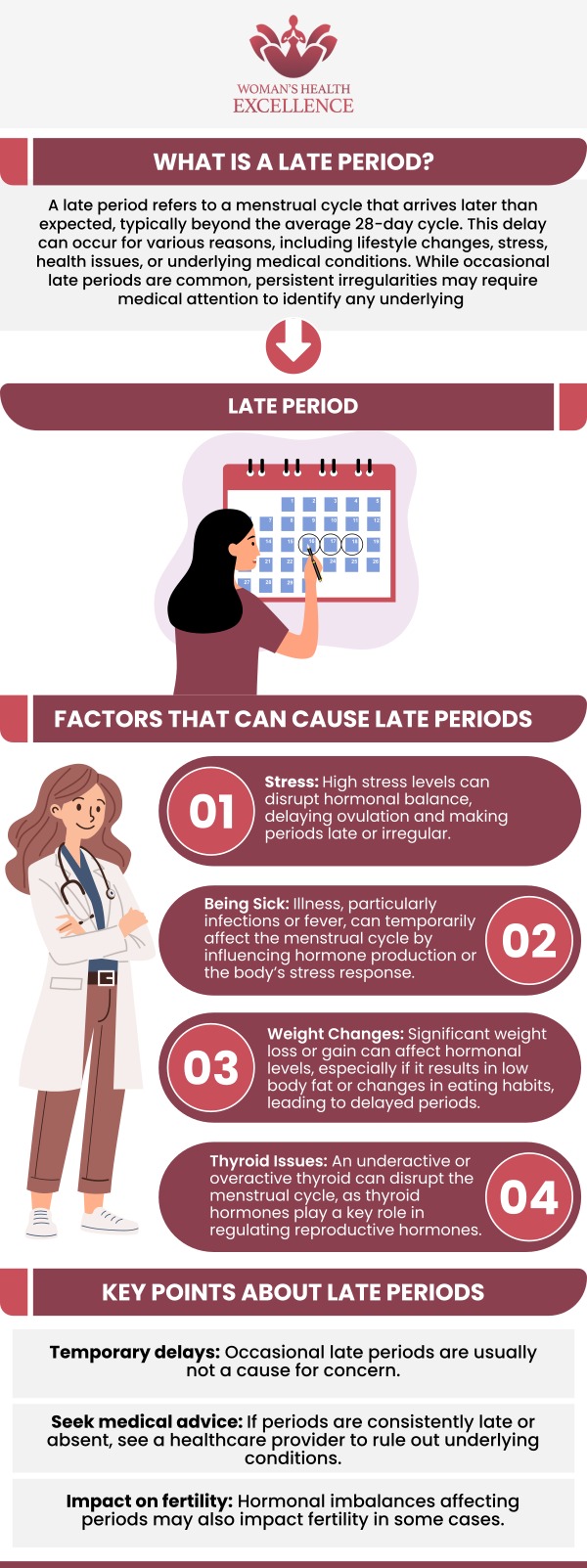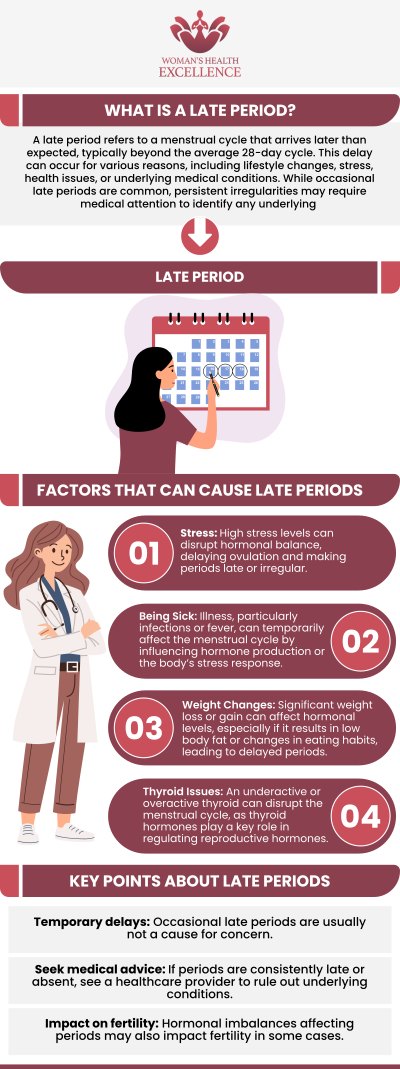4 Days Late Period: Common Reasons Explained
A late period can be caused by various factors, from stress and hormonal imbalances to changes in diet or exercise routines. In some cases, it may be linked to underlying health conditions such as polycystic ovary syndrome (PCOS) or thyroid disorders. Pregnancy is another possible reason for a missed period, especially if you’re sexually active. At The OB-Gyn & Incontinence Center, Dr. Prema Kothandaraman provides expert evaluation and care to help determine the cause of your late period and recommend appropriate treatment options. For more information, contact us today or book an appointment online. We have convenient locations to serve you in Arcadia and Glendale, CA.


Table of Contents:
What are the most common reasons for a period being 4 days late?
Could pregnancy be the reason for a 4-day late period?
How does irregular sleep impact period timing?
Is a 4-day late period normal for women with irregular cycles?
At The OB-Gyn & Incontinence Center, we understand that a delayed menstrual period can be concerning. A menstrual period being four days late can result from several common factors, and our team is here to help you identify the cause and provide appropriate care.
One of the most frequent reasons for a delayed period is pregnancy. If you have been sexually active and your period is late, we recommend taking a pregnancy test to confirm or rule out pregnancy as a possibility. Our experienced OB-Gyn providers can assist you with pregnancy testing, verification, and the next steps.
Stress is another common factor that impacts menstruation. High levels of emotional or physical stress can alter hormone levels, delaying your period. Similarly, significant lifestyle changes—such as traveling, moving, or adjusting to a new work schedule—can disrupt your menstrual cycle due to their effects on the body’s internal clock. Our compassionate team can offer guidance on managing stress and its effects on your health and menstrual cycle.
Hormonal imbalances can also lead to delayed or missed periods. Conditions commonly evaluated and treated at The OB-Gyn & Incontinence Center include polycystic ovary syndrome (PCOS), thyroid disorders (hypothyroidism or hyperthyroidism), and other endocrine conditions. Our specialists can perform thorough assessments, diagnose underlying hormonal imbalances, and provide personalized treatment plans to help regulate your menstrual cycles.
Weight fluctuations—whether from significant weight loss, weight gain, or intense exercise routines—can also cause menstrual irregularities. Changes in body weight or composition can influence hormone production and disrupt the menstrual cycle. Our providers can offer individualized guidance on maintaining a healthy lifestyle and balanced weight to promote optimal reproductive health.
Additionally, certain medications or medical conditions may contribute to delayed menstruation. Birth control pills, hormonal contraceptives, and medications prescribed for various medical conditions can alter your menstrual cycle. Medical issues such as chronic illnesses, infections, or reproductive health conditions may also result in delayed periods. We carefully review your medical history, medications, and symptoms to identify potential causes and recommend appropriate treatments.
At The OB-Gyn & Incontinence Center, we understand that delayed or irregular menstrual cycles can cause concern, especially if you are sexually active and suspect pregnancy. A period delayed by four days or more can indeed indicate pregnancy, as pregnancy is one of the most common reasons for menstrual irregularities. Typically, pregnancy is confirmed through home pregnancy tests, which detect human chorionic gonadotropin (hCG), a hormone produced during pregnancy. These tests become increasingly reliable after a missed period, and accuracy improves each day after your expected menstruation date.
However, in our practice, we also emphasize that pregnancy isn’t the only reason for delayed periods. Menstrual irregularities can result from various factors, including stress, hormonal imbalances, weight fluctuations, intense physical activity, certain medications, thyroid dysfunction, or conditions like polycystic ovary syndrome (PCOS).
If you suspect pregnancy or if you are concerned about delayed or irregular periods, we encourage you to take an at-home pregnancy test or schedule a consultation with one of our experienced providers at The OB-Gyn & Incontinence Center. Our dedicated medical team can help determine the underlying cause of your menstrual irregularities, provide accurate pregnancy testing, perform necessary diagnostic evaluations, and discuss suitable treatment options tailored specifically to your health and well-being.
Irregular sleep patterns not only impact menstrual cycle regularity but can also significantly affect overall women’s reproductive and pelvic health. At The OB-Gyn & Incontinence Center, we recognize that consistent, restful sleep is essential for maintaining hormonal balance—a crucial factor in reproductive and pelvic wellness.
The menstrual cycle is finely regulated by hormones such as estrogen, progesterone, and luteinizing hormone, all of which rely on a delicate balance sustained by consistent sleep and circadian rhythms. Disrupted or inconsistent sleep schedules can upset the body’s internal clock, causing fluctuations in hormone levels. These hormonal shifts may delay or advance ovulation, resulting in irregular menstrual cycles, heavier or more painful periods, or even missed menstrual cycles.
Moreover, irregular sleep can elevate cortisol, the body’s primary stress hormone, which negatively impacts reproductive hormones. Elevated cortisol levels disrupt the normal functioning of the hypothalamic-pituitary-ovarian (HPO) axis—the hormonal pathway critical for regulating menstrual cycles and reproductive health. Chronic sleep disturbances can thus lead to hormonal imbalances that may further contribute to pelvic discomfort and menstrual irregularities and negatively influence urinary and pelvic floor health—including symptoms of urinary incontinence.
At The OB-Gyn & Incontinence Center, we encourage patients experiencing irregular menstrual cycles or pelvic health concerns to consider their sleep habits as part of their comprehensive evaluation. Maintaining a regular sleep schedule and prioritizing adequate rest can help restore hormonal balance, enhance reproductive health, and improve overall pelvic function. If chronic sleep disturbances persist or if menstrual irregularities and pelvic symptoms continue, we invite you to schedule a personalized evaluation with our experienced healthcare providers, who can offer specialized guidance and tailored treatment to support optimal women’s health.
At The OB-Gyn & Incontinence Center, we understand that irregular menstrual cycles can often be a cause for concern among our patients. A menstrual period that is delayed by four days can generally be considered normal, particularly for women who experience irregular menstrual cycles. Irregular cycles frequently vary in duration, frequency, and intensity, making precise predictions about menstruation challenging.
Numerous factors such as hormonal imbalances, stress, significant weight fluctuations (either gain or loss), intense physical activity, and certain medications can all contribute to these variations. At our practice, we emphasize the importance of understanding your menstrual patterns and encourage open communication regarding any concerns you may have.
While occasional delays of several days are often within the normal range due to natural fluctuations in hormone levels and ovulation patterns, significant and persistent changes in your menstrual cycle, prolonged delays, severe pain, heavy bleeding, or unusual discharge should prompt a medical evaluation. Our specialists at The OB-Gyn & Incontinence Center are available to assess symptoms and determine if underlying conditions, such as polycystic ovary syndrome (PCOS), thyroid disorders, or other hormonal irregularities, may be contributing to your irregular cycles.
In general, a normal late period, without additional symptoms, usually does not indicate a serious medical issue. However, monitoring your menstrual cycles and discussing any persistent irregularities or concerns with our healthcare professionals is always advisable.
At The OB-Gyn & Incontinence Center, we are committed to providing personalized care to ensure your reproductive and overall health, addressing your concerns, and offering reassurance and peace of mind. For more information, contact us today or book an appointment online. We have convenient locations to serve you in Arcadia and Glendale, CA. We serve patients from Arcadia CA, Glendale CA, Monrovia CA, Pasadena CA, Los Angeles CA, Burbank CA, and surrounding areas.


Additional Services You May Need
▸ Urogynecology
▸ Minimally Invasive Gynecology
▸ Monalisa & Medical Aesthetics
▸ Bioidentical Hormone Replacement Therapy
▸ Urinary Incontinence
▸ Pelvic Organ Prolapse
▸ Painful Bladder
▸ Urinary Tract Infection
▸ Genitourinary Syndrome of Menopause
▸ Female Sexual Dysfunction
▸ Urinary Retention
▸ Vaginal Laxity & Prolapse
▸ Postpartum Pelvic Floor Problems
▸ PCOD
▸ Bladder Prolapse Repair
▸ Urgent PC
▸ Fibroids
▸ Excessive Bleeding
▸ Pelvic Pain
▸ Birth Control & IUD
▸ Vaginal & Pelvic Infection
▸ Monalisa Touch
▸ STD
▸ TempsureVitalia
▸ Biote Pellet Therapy
▸ Topical BHRT
▸ Flexsure
▸ Rectal Prolapse Repair
▸ Tempsure ENVI
▸ Minimally Invasive Pelvic Surgery for Incontinence



